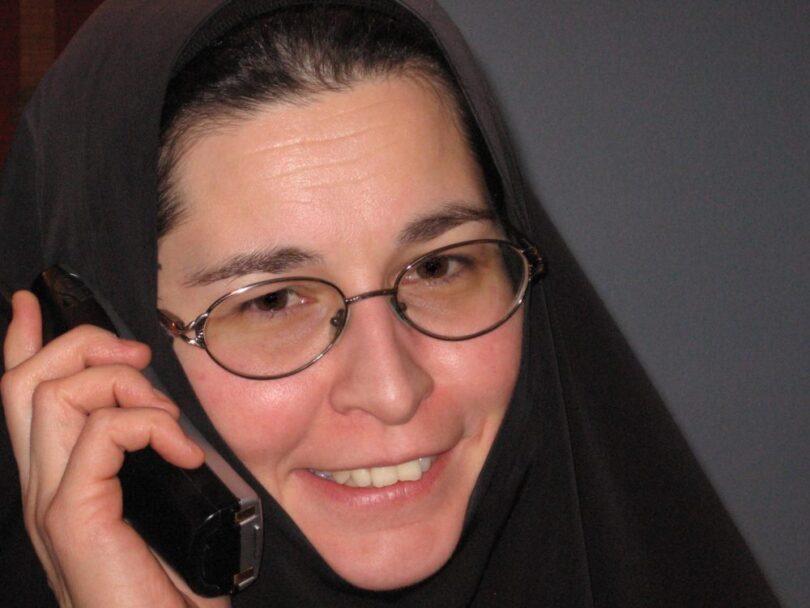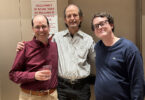We dedicate this second interview to the discussion engendered by her first interview, as well as to some other widely-discussed issues in which Sr. Vassa has been actively involved.
You mentioned an “insensitivity to history” as a reason for the recent divisions in the ROCOR (in the wake of the reconciliation with the MP). Since you spent several years studying the archives of the ROCOR and reflecting on our history, could you tell us more about this connection between our attitude toward history and the divisions in our Church?
It would seem that issues surrounding the Act of Canonical Communion with the Moscow Patriarchate (MP) have already been argued to death. However, I think one central question was hardly touched upon at all, leaving many of us either uneasy or at least puzzled by the whole affair. The unresolved question has to do with history, and it can be formulated as follows: In light of the well-documented statements of ROCOR’s councils and hierarchs of earlier decades, the decision to enter into communion with the MP means a radical change in policy, and hence a break with our history. So, how can this decision be acceptable for the Church? The question is in and of itself interesting, because it presumes that “change” and “church history” cannot possibly belong in the same sentence.
This concern for continuity, though doubtlessly well-meaning, betrays a rather hazy perception of church history; as if inconsistencies and changes never occurred; as if the earthly Church galloped through the centuries on a white horse, in effortless consistency and triumph. Having learned a minimal amount of church history as children, many of us continue to base our conceptions of church life on this “Walt Disney” version as adults. But just as children eventually grow up, and cease to see their parents as god-like creatures – though continuing to love and venerate them no less as parents – so could we be expected to mature in our perception of the Church in her past and present.
The grown-up version of church history tells us that the Church of the Apostles decided on a change in policy from the very outset. The so-called Council of the Apostles in Jerusalem decided not to circumcise the Gentiles (as described in Acts 15), in blatant discontinuity with no less than the Law of Moses, and with what the Apostles themselves had been preaching thus far. The decision was not popular with everyone and resulted in the schism of the Judaeo-Christians. Nonetheless, it was this that “seemed good to the Holy Spirit” and to the Apostles, and not a more consistent and traditional policy. There was apparently a “bigger picture” that was more important than consistency with past policy. In the mid-3rd c., after many Christians broke under the pressure of persecutions and worshipped pagan gods, previously upheld canonical discipline demanded that these “lapsi” or fallen ones be excommunicated for life. But, to the dismay of many, the Church chose to be inconsistent with previous policy and opted for clemency. The many faithful who opposed this decision, which did indeed signalize a break with past policy, broke away into the schism of the Novatianists. Similar unpopular decisions were that of the Second Ecumenical Council to not re-baptize the Arians (the Arians!); the decision of the Seventh Ecumenical Council to accept iconoclast bishops as bishops; and the list could go on.
So, inconsistency and change in and of themselves are nothing new in the history of the Church, nor is opposition and schism on the basis of such changes. Yet it seems that in the recent discussions and divisions in our Church, change was perceived as something of a shock. This is what I meant by “insensitivity to history.”
It has become a commonplace to oppose a deviated Western Latin theological mindset to Eastern Orthodox phronema. Is this a false dichotomy?
I will not pretend to do this complex question justice in an interview, but – since you ask – I shall share a few thoughts.
A dichotomy involving the very broad concepts, “East” and “West,” is, of course, a generalization. And any generalization is inexorably doomed to oversimplify and hence distort the reality it attempts to explain. Let me relativize the dichotomy with a few observations. First, the East-West distinction did not exist when modern educated thought was originating in the ancient Greek philosophical “schools” in both East and West: About six centuries BC, we have the Miletians on the coast of today’s Turkey, and the Pythagoreans where? in Southern Italy. The East-West distinction comes into theological play only from the 3rd-4th c. AD, when Latin replaced Greek as the language of the educated class in the West. But today the borders are once again blurred in our globalized world, when American culture permeates every city from London to Athens and from Moscow to Hong Kong. Add to this the fact that many generations of Orthodox have been educated in “Western” schools or school systems.
Having said that, I will state the obvious – that of course there are marked differences between Eastern and Western Christianity (I am referring only to the Orthodox and Roman Catholic Churches), though I am not sure what you mean by “deviated” in your characterization of the “Western Latin theological mindset.” Be that as it may, the Catholic-Orthodox discrepancies – rooted in theological tendencies – are most evidently expressed in different styles of worship and church administration.
The theological issues must be investigated by both sides – not downplayed nor politically exploited – in conscientious and professional theological discussion. Unfortunately, however, today the Orthodox-Catholic differences are often exploited to foster “Orthodox” identity. I mean the penchant of Orthodox religious instructors or preachers for beginning their line of thought with a negation of some “Catholic” teaching: “The Catholics teach that… Now, we the Orthodox don’t say that because….” Such a method is disturbing because it reduces “Orthodoxia,” – an affirmation of true faith and worship – to a negation of Catholicism. One Catholic priest once said to me jokingly – after he had listened to a recording of a well-known Moscow theologian making fun of several Catholic saints: “You should thank us, because you wouldn’t exist if it weren’t for the Catholics.” Now, this comment is clearly offensive, but it is a reaction to an Orthodox theologian ridiculing that which is holy to Catholics, i.e., highly-venerated Catholic saints. This is all the more offensive since it was unprovoked.
As we contemplate and nurture our Orthodox identity today, perhaps it would be more constructive to keep in mind that the fundamentals of this identity were articulated by the Ecumenical Councils at a time when the Churches of East and West were one. Significantly, unity was maintained despite the liturgical differences, which were almost fully developed in that same period. Also, in light of the demographic crisis facing traditionally Christian countries, where Islam seems soon to become the dominant religion, we would perhaps be well-advised to reconsider the wisdom of dedicating our theological energy to attacks on Catholicism – the largest Christian denomination in our increasingly non-Christian world.
Many of our faithful think it inappropriate for the Orthodox even to discuss “women’s issues.” For example, when the wife of one of our priests heard about the First ROCOR Women’s Conference in Glen Cove in June, 2008, she said that she would never take part “in such a feminist undertaking.” One of our clergymen who had heard about your talk “Ritual Im/Purity” commented: “How is the topic discussed by Sr. Vassa supposed to bring people closer to God?” Do you care to comment?
It is not easy to respond to hearsay. And for the record, we should keep in mind that we actually have no idea as to what “many of our faithful think,” because as a rule the Orthodox do not conduct professional surveys, nor do we even have any dependable statistics.
In any event, our Church has held conferences dedicated to certain demographics, to the exclusion of others: we have “Youth Conferences” to the exclusion of older people; we have had conferences dedicated to “The Orthodox Family” to the exclusion of single people and monastics (and – honestly – I was not offended). In Russia there have also been conferences dedicated to monastics of different monasteries, to the exclusion of non-monastics. This means that the Church has not found it “inappropriate” to address the “issues” of these demographics. It is also clear that the Church recognizes “men” and “women” as distinct categories in her fold: the distinction is made both in our liturgical lives, as well as in the administrative structure of the Church. To name just a few distinctions, women are encouraged to wear headscarves while men are not; women do not enter the sanctuary while men do; women may not be ordained while men may, etc. So the Church recognizes the distinct demographic “women,” thus providing it with a distinct ecclesial experience and its own “issues.” We can thus conclude that a.) “women” exist as a distinct group in the Church; b.) “women’s issues” exist in the Church, and, c.) it is OK to discuss these issues at conferences, just as this is done for other demographics.
Can a discussion of the liturgical question of ritual im/purity from a theological standpoint “bring people closer to God?” Just like anything else we do that is church-related, it depends on how we approach the task. If, for example, while singing in the church choir my mind is never occupied by prayer, but by idle and perhaps clearly sinful thoughts, then I could ask: Does singing in a church choir bring me closer to God? If my baking cookies for the parish sisterhood somehow causes me to quarrel with my husband and leaves me indisposed to prayer, I can wonder: Does baking cookies for the parish sisterhood bring me closer to God? If cleaning the candle-stands in church every Saturday makes me hate all the people in church who do not clean the candle-stands every Saturday, I could ask a similar question. We could and should question church-related activities in this way – our own activities, that is.
Concerning the comment of the priest’s wife, I don’t know the exact reasoning behind it. But the part about “feminist undertaking” gives me a clue. The term “Feminism,” which I call “the F word” because it often has the effect of a profanity, is similar to the term “ecumenism”: we are not really sure what it means, but we have this gut feeling that it is something very, very bad.
The fact is that “feminism” can mean different things. It certainly always involves a discussion of “women’s issues,” but we have already established that that is OK. In its radicalized form, “feminism” can mean a conviction that any differences between men and women can and should be eliminated; a radicalized feminism may also encourage female homosexuality in the name of total female self-sufficiency, etc. This is indeed a “very, very bad” thing. On the other hand, “feminism” is a sentiment that in the 20th c. led to women receiving higher education and the right to vote; that provided women with protection against sexual harassment; that led to women being recognized and treated as adults, etc. One would be hard put to prove how these developments could be considered un-Christian, un-Orthodox, or “bad” in any way. Could you imagine an Orthodox hierarch getting up and saying that parents should not send their daughters to college, but encourage them to marry with no higher education, because that’s how it was in the good old days? Would you agree with your parish priest announcing that women should not vote in next year’s congressional elections, because it is not their place? If not, then a century ago you would definitely have been considered a “feminist.” In any event, it is “feminism” that made it possible for women to do these things, which you today take for granted. My point is: if we take for granted that today women are treated as adults, we will have to reject the notion that “feminism” is a “bad thing” per se. And this means the concern for and discussion of “women’s issues.”
Sometimes I observe that Orthodox Christians express contempt towards education and especially towards disciplines that are not directly related to Orthodoxy, such as literature, psychology and philosophy. You have commented in your interview about the impossibility and the detriment of isolating ourselves from the surrounding world. But how do you think does one balance benefiting from what the non-Orthodox world has to offer, yet managing not to compromise our beliefs?
If we are indeed concerned with “managing not to compromise our beliefs,” then it is necessary to learn what those beliefs are, particularly in the context of today’s world. And that is not possible without an education, including literature, psychology, and philosophy. But a knowledge of these things is not only a useful tool for dealing with “the world”; it is also needed for understanding our own tradition. It took the knowledge of all three of these disciplines – literature, psychology, and philosophy – to create the liturgical texts and rites of the Orthodox Church, as well as most of the patristic writings. So, a contempt for these disciplines must extend to traditional Orthodox culture and thinking as well. It may also be helpful to remember that many Orthodox Christians of more recent times – for example, F. M. Dostoevsky and Metropolitan Anthony Khrapovitskii demonstrated a healthy interest in these fields, and were no less Orthodox for it.
As for “benefiting from what the non-Orthodox world has to offer,” let us review what this involves: we eat potatoes grown by non-Orthodox farmers; we get in and out of automobiles and airplanes designed by non-Orthodox engineers; our computers and telephones are also manufactured by non-Orthodox; and we send our children to non-Orthodox schools. We may even hire non-Orthodox architects to build our church, take an evening course given by a non-Orthodox professor at a community college, or consult a non-Orthodox child psychologist in addressing the difficulties that our autistic child is having in school. In doing these things, do we compromise our beliefs? Well, we might commit some sin while having the non-Orthodox-grown potatoes, or while reading a non-Orthodox textbook, driving an automobile, using a computer, or talking on a telephone (such as passing judgment on other Christians for being interested in literature, psychology, and philosophy); we may lose sight of sharing the benefits of these things with the needy, or neglect to use them to the greater glory of God, or lose our tempers when the service or product we purchased turned out unsatisfactory. But in this case we have ourselves to blame for how we made use of our blessings, and not “the non-Orthodox world” for having made them available.
To condemn education, or literature, or philosophy, or psychology as if these things were “bad” in and of themselves – instead of condemning their abuse by human error or sin – is a classic yet tempting mistake of the pious mind. But it is one that the Church does not make, just like the Church does not condemn wealth, power, alcohol, youth, music, etc., – in and of themselves. These things are God-given gifts, or the products of God-given talents, and it is how we use them that can be either “bad” or “good,” as we choose in our God-given freedom.
I know how busy you are, and thank you for taking the time to answer our questions. I hope that this fruitful discussion will continue.











